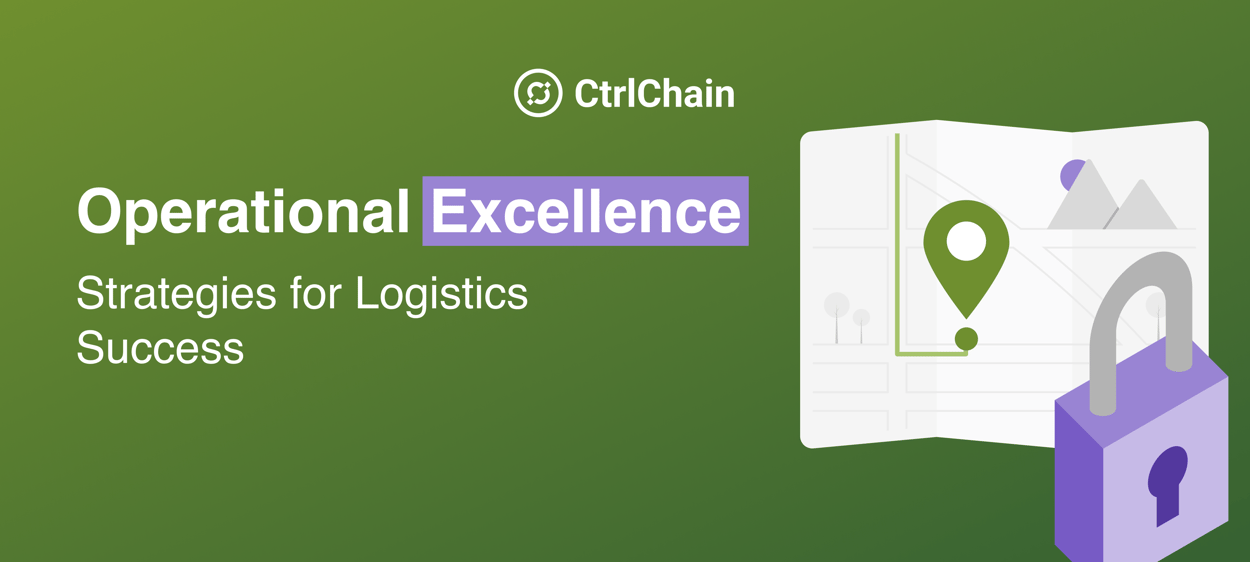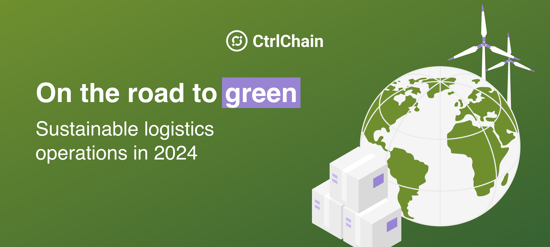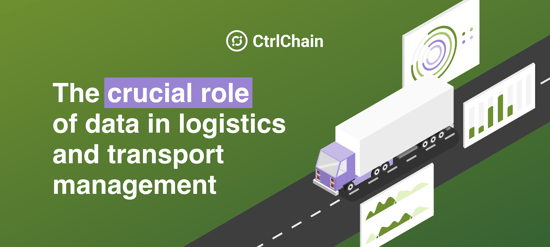Operational excellence is essential for success and sustainability in the logistics sector. However, trust issues plague the industry, especially with third-party brokers. Addressing these issues is crucial.
Let us explore how controlling logistics and supply chain management can build trust and ensure operational excellence.
Trust issues in supply chain efficiency
In the globalised business landscape, supply chain management plays a pivotal role in the success of organisations across various industries.
The efficiency and effectiveness of supply chain operations can significantly impact a company's profitability, customer satisfaction, and overall competitiveness.
However, one persistent challenge in supply chain management is the lack of collaboration and trust among supply chain partners.
A lack of trust can affect business relationships and operational success. There are several factors contributing to trust issues:
- Lack of collaboration and trust: Each stakeholder within the supply chain often maintains its own data and processes, leading to a lack of transparency and visibility. This results in inefficiencies, delays, and increased costs when coordinating and making informed decisions.
- Limited visibility: Without collaboration and trust, organisations struggle to gain real-time visibility into their supply chains. This limited visibility makes it difficult to anticipate disruptions, manage inventory effectively, and respond to changing customer demands promptly.
- Risk amplification: Suppliers may not be forthcoming about potential issues, leading to severe disruptions when problems eventually surface. This lack of risk management can adversely affect product quality, delivery timelines, and customer satisfaction.
- Inefficient communication: Poor communication can result in misunderstandings, missed deadlines, and a failure to align on strategic objectives.
Fraudulent practices and their industry impact
Two main types of fraud, double brokering and load phishing, are particularly problematic.
- Double Brokering: This scheme disrupts the load board system by involving a fraudulent "carrier" who poses as a legitimate trucking company. They agree to terms on the platform and then broker the load to a genuine carrier, pocketing the profit without compensating the legitimate carrier. This leaves the legitimate carrier unpaid and vulnerable to cargo theft.
- Load Phishing: In this newer form of fraud, scammers impersonate carriers on load boards, negotiating and securing loads using deceptive tactics. Despite appearing legitimate, they vanish after picking up the load, resulting in cargo theft.
These fraudulent practices not only cause financial losses but also damage the reputation of businesses and the industry.
The risk of cargo theft, especially for high-value goods, is a growing concern.
According to the Transport Asset Protection Association (TAPA), cargo theft during road transport across Europe, the Middle East, and Africa (EMEA) amounted to over €172 million in 2020.
High-profile cases, such as Blue Water Shipping overbilling for freight services that were never performed and for improper markup allegations and banks facing losses due to falsified shipping documents, highlight the severity of the issue.
However, while combating fraud remains paramount, another pivotal aspect shaping the industry's landscape is the significance of customer service.
The significance of customer service in logistics and its shortcomings
Ensuring timely delivery of the right product in the right condition, place, time, and price is critical for success in logistics.
Companies must exceed customer expectations to gain a competitive edge, managing the entire customer journey from order placement to delivery.
Exceptional customer service builds strong relationships, enhances reputation, and drives business growth.
Research shows that personalised service leads to increased spending and sales growth.
However, failing to address customer service concerns can have severe consequences.
A significant 70% of buying experiences are influenced by how customers feel they are treated, and 90% worldwide consider issue resolution their top customer service concern.

Logistics disruptions, inaccurate order processing, communication breakdowns, poor product condition, and inefficient returns management are common challenges leading to customer dissatisfaction.
Addressing these issues is essential for delivering exceptional customer service and maintaining a competitive edge in the logistics industry.
Strategies for achieving operational excellence in logistics
Let us delve into some effective strategies to drive continuous improvement in operations and achieve operational excellence.
Ensuring information visibility and transparency
Increased supply chain visibility enhances customer satisfaction by simplifying processes and providing instant gratification. Transparency, including shipping information and price comparisons, builds credibility and trust.
Offering tracking updates and transit times keeps customers informed, enhancing the overall brand experience.
Technology integration
Leveraging technology is pivotal in enhancing operational efficiency and decision-making in today's logistics landscape. Innovative solutions such as Artificial Intelligence (AI), the Internet of Things (IoT), and data analytics provide real-time insights and automate routine tasks.
AI aids in demand forecasting and route optimisation, while IoT devices enable real-time tracking of shipments and inventory. Data analytics facilitates informed decision-making based on insights from large data sets, improving accuracy, speed, and reliability in logistics operations.
Customer-centric approach
Customer-centric logistics operations are vital for achieving operational excellence:
- Reliable deliveries: Ensuring timely and reliable deliveries to meet customer expectations.
- Quality assurance: Maintaining high-quality standards in all logistics processes to ensure customer satisfaction.
- Feedback and adaptation: Regularly collect customer feedback and adapt logistics strategies accordingly.
Defining Supply Chain KPIs
Setting specific logistics performance management parameters is crucial for tracking operations and making informed decisions.
Key Performance Indicators (KPIs) such as order accuracy, on-time delivery, lead time, stock rotation, warehousing costs, truck turning, capacity utilisation, productivity, transportation costs, and number of shipments act as benchmarks for measuring performance and identifying areas for improvement.
While 82% of shippers believe technology will make KPI management easier in the next two years, the majority of businesses still rely on spreadsheets.
Paper documents dominate the global cargo trade with four billion in circulation at any one time, posing challenges such as easy falsification, loss, and time delays.
Embracing technology for KPI management streamlines operations enhances accuracy, and improves efficiency in logistics processes.
Incorporating these strategies and embracing technology are essential steps toward continuous improvement in operations and achieving operational excellence in the dynamic and competitive logistics industry.
Choosing technology for logistics optimisation
Selecting the appropriate technology is crucial for continuous improvement in operations and achieving operational excellence in logistics. Here is why:
- Access to a reliable carrier network: Partnering with carriers prioritizing safety and compliance is essential. Utilizing platforms like CtrlChain ensures due diligence in carrier selection, offering personalized carriers with real-time tracking and dedicated support.
- All-in-one platform: With a centralized system like CtrlChain, you can plan and execute your entire shipping process seamlessly. This comprehensive approach provides complete network visibility, streamlining operations and enhancing efficiency.
- Minimize paperwork: Automating paperwork minimizes paperwork, allowing you to maximize resources and focus on core activities. CtrlChain facilitates timeslot booking, estimated cargo value calculations, and seamless communication between carriers and shippers, reducing administrative burdens and ensuring trustworthiness to avoid fraud in shipments.
- Logistics optimization: Choosing a technology solution that tracks and analyzes shipment data empowers you to make informed decisions.
Selecting the right technology that optimises operations through data-driven insights, you can streamline processes, enhance productivity, and stay ahead in this competitive landscape.
Final thoughts
Achieving operational excellence in logistics demands a strategic blend of trust, technology, and customer-centricity.
From combating fraud to embracing innovative solutions, companies must navigate challenges while prioritising transparency and efficiency.
By leveraging cutting-edge technologies like CtrlChain system and fostering strong partnerships, logistics firms can streamline operations, exceed customer expectations, and drive sustainable growth in their dynamic landscape.



